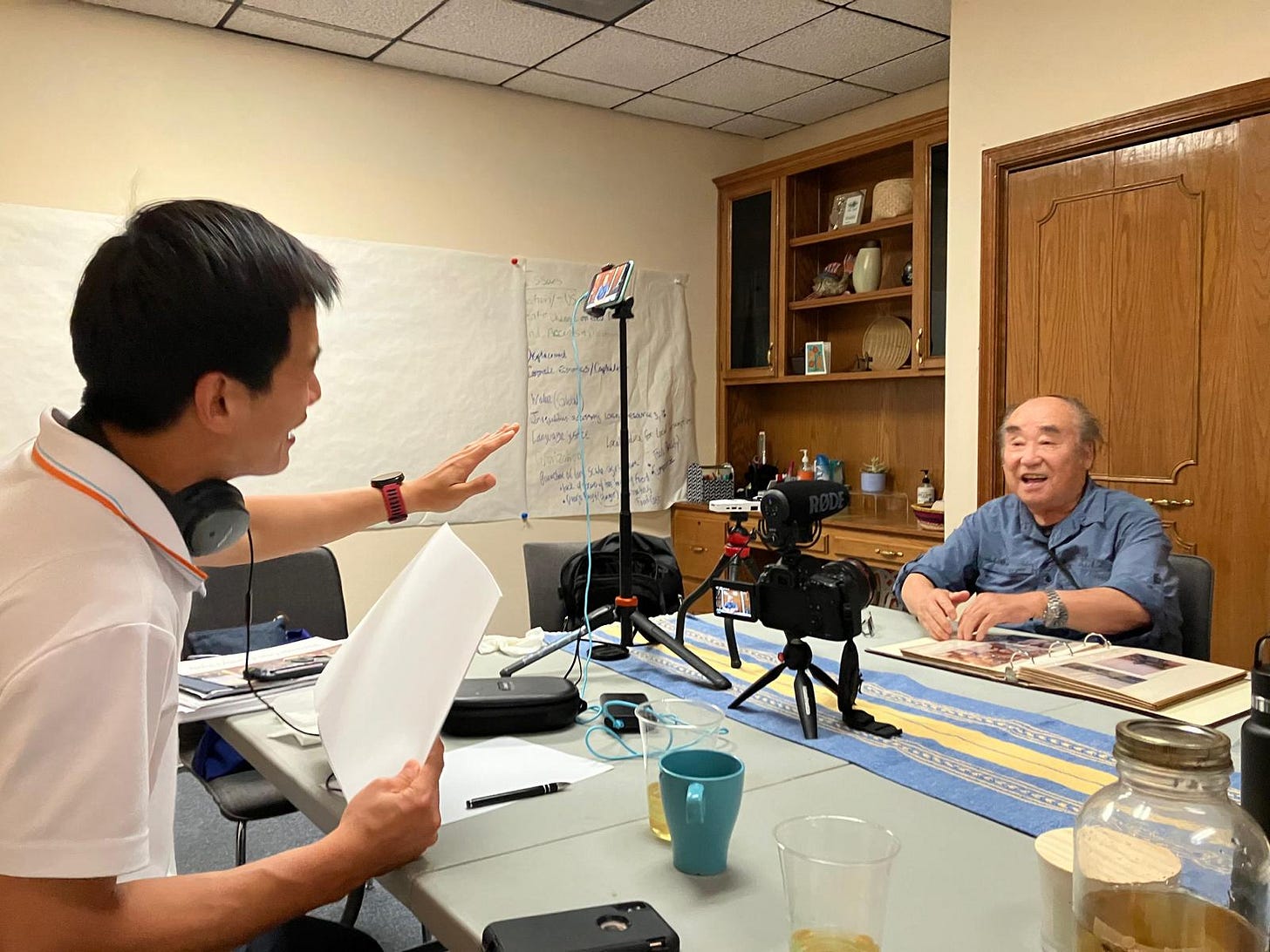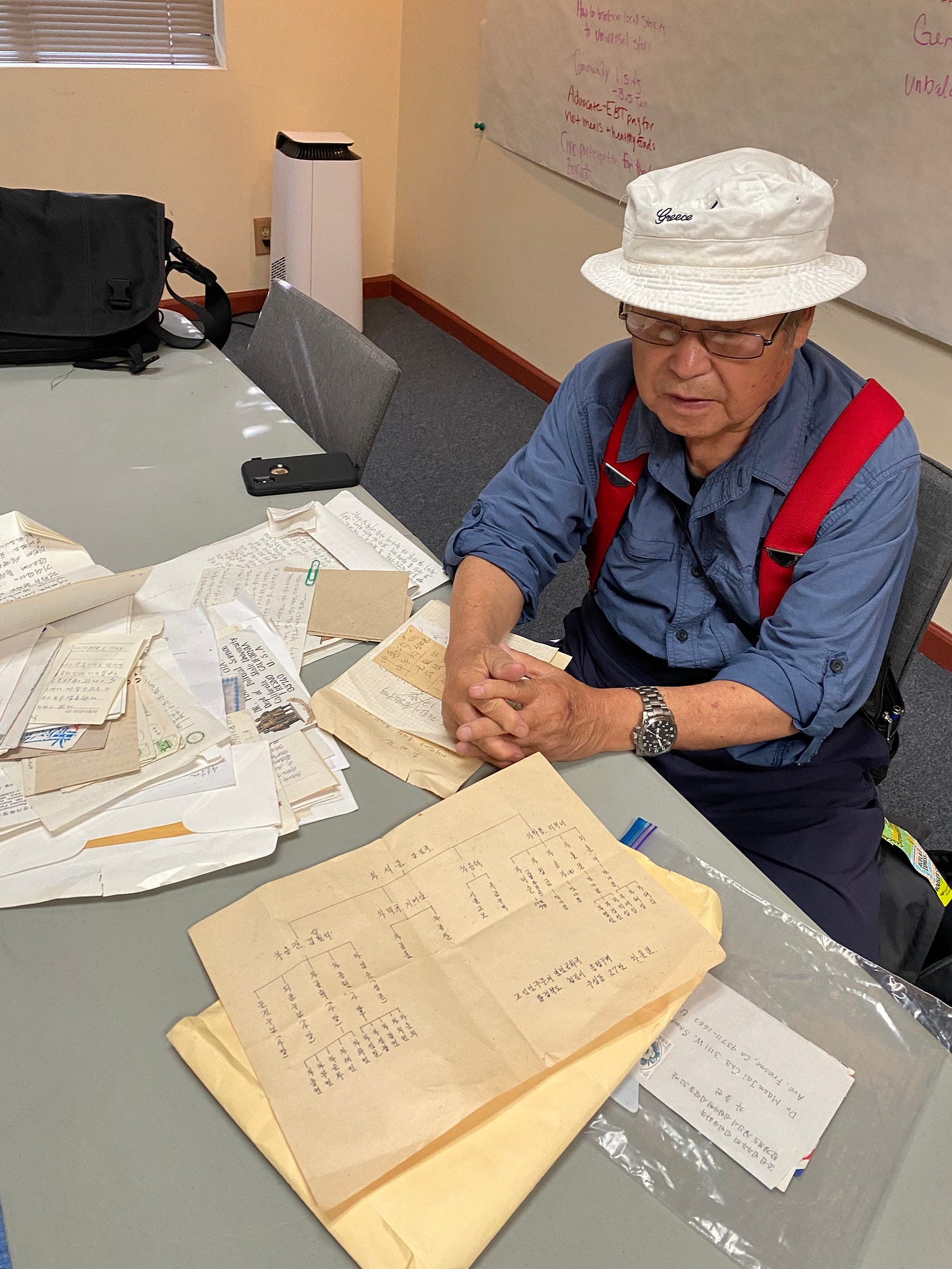Building kinship across generations
Reflecting on three full days in Central/Southern California...
Though I’m fighting the effects of sleep deprivation on this flight from LA to Washington DC (which will be my first time back there since moving out 11 months ago…!) I feel determined to reflect on the past three days in California (including Fresno, LA, Pasadena, and Glendale), which were quite full but also quite fulfilling. In many ways, it feels like I’m in the thick of this marathon trip, as I’m starting to feel both the physical, mental, and emotional wear and tear of constant travel and holding some quite heavy stories. Yet at the same time, I feel like this is the most supported I’ve felt so far on this entire trip, ranging from old friends providing rest at healing wells, to new and unexpected connections who have appeared like an oasis in the desert to refill my cup.
I’m not going to be able to name all these sources of support and replenishment here, but here are some that feel most top of mind. The first was in Fresno, where I stopped for seven hours on my way down to LA from San Francisco to meet with Dr. Marn Cha (a professor originally from Chongjin, North Korea who wrote a book on Koreans in Central California) and Jennifer Deibert (DPRK Program Director at the American Friends Service Committee, the organization sponsoring this project). A few months ago, Jennifer had connected me with Dr. Cha after reading his book and discovering that he had been able to visit his hometown to meet his relatives in 1992. Jennifer not only let me use her organization’s office space for the interview, but also provided some much-welcomed refreshments (including fresh peaches from her farm and chilled Korean corn tea) that made us feel comfortable and welcome.
It was clear that Dr. Cha has a strong emotional connection with his uncles and cousins in North Korea, which he has preserved meticulously through photos and letters despite not being able to see them in almost 30 years and losing contact for the past 20 years. But Dr. Cha’s sense of kinship extends beyond his shared bloodline or Korean heritage – in his closing message, he encouraged younger generations to broaden their understanding of family separation to include refugees and migrants from more recent conflicts. I couldn’t agree more with this call for solidarity and empathy for divided families around the world and throughout history (the main reason Eugene and I started the Divided Families Podcast) and how knowing this history helps me navigate my own identity.
In LA (arguably the epicenter of the Korean American community), I had tried reaching out to various associations of people hailing from North Korea, each with their own agenda, politics, and leadership structure. In the end, I was able to meet with representatives of two organizations – the LA chapter of the Korean-American Assembly for Reunion of Separated Families (일천만이산가족위원회) and the Southern California Council of Korean Americans from the Hamgyung Namdo Province (남가주함경남도민회). Through the former, I was able to interview Mr. Seung Suk Byun, a 95-year old retired electrical engineer from Hwanghaedo who was separated from his pregnant wife and was only able to visit his hometown in the mid-2000s, after she had already passed away. My heart swelled as he shared how he ended up giving his relatives all of the things he brought with him on that trip, to the point where he only returned to the hotel that evening with a toothbrush and the clothes that he was wearing that day.
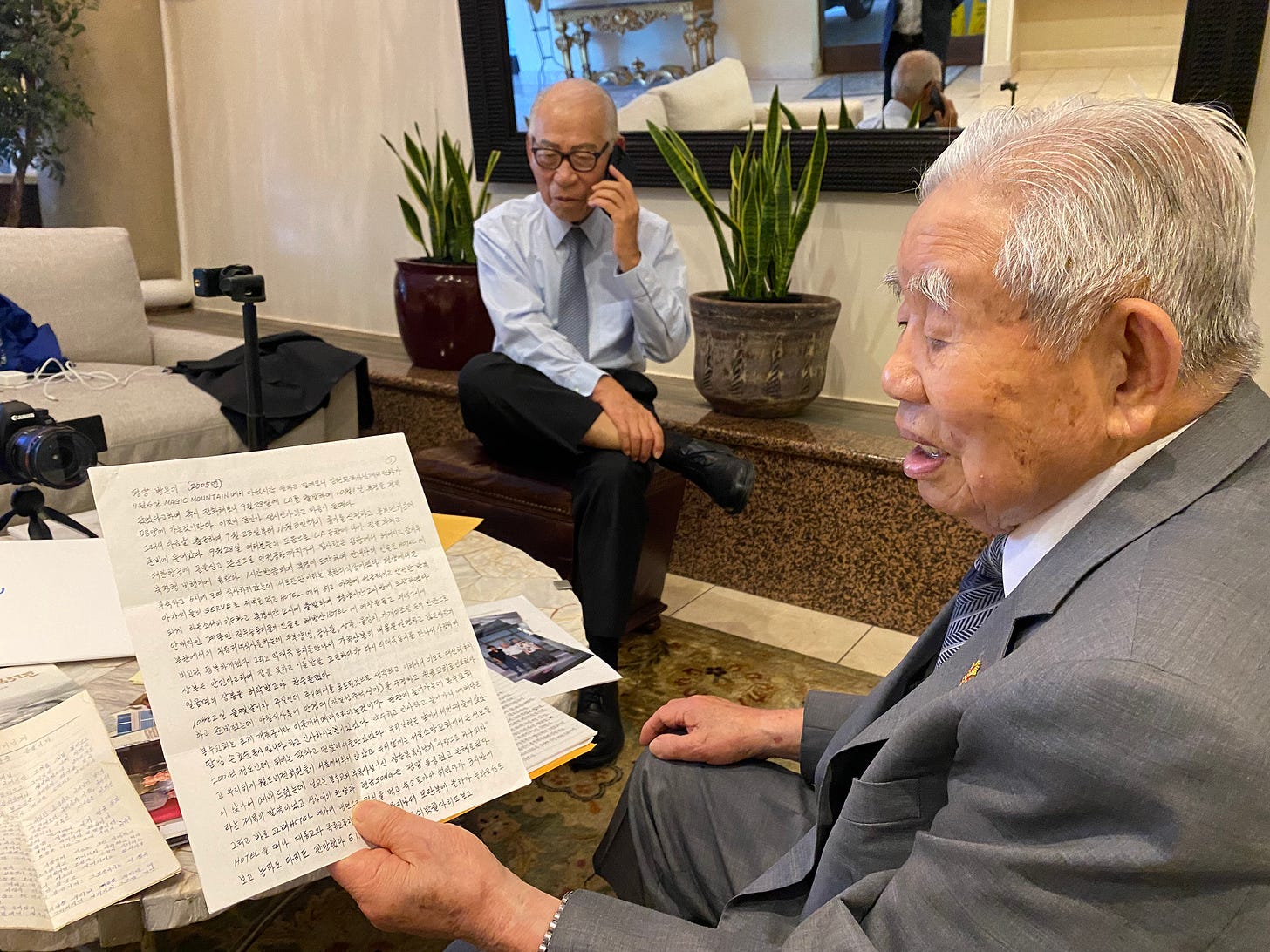
His memoir, titled “65 years after a fortnight” (보름 후 65년) includes a prologue, in which he understands and forgives the Demilitarized Zone (DMZ) which has separated North and South Korea since 1953, but asks for it to please go away. As we said goodbye, one of the leaders of the organization gave me a warm hug and said “we’re proud of you, Paul,” bringing tears to my eyes that someone meeting me for the first time could put such confidence in me.

The latter organization introduced me to Mr. Seong Joo Kwon (who I realize I had actually met the last time I visited LA), for whom a promise with his older brother to come back to Hamhung in three days has turned into 73 years. Mr. Kwon shared how he cries whenever he listens to his brother’s favorite classical music composers like Beethoven, Tchaikovsky, or Mendelssohn*
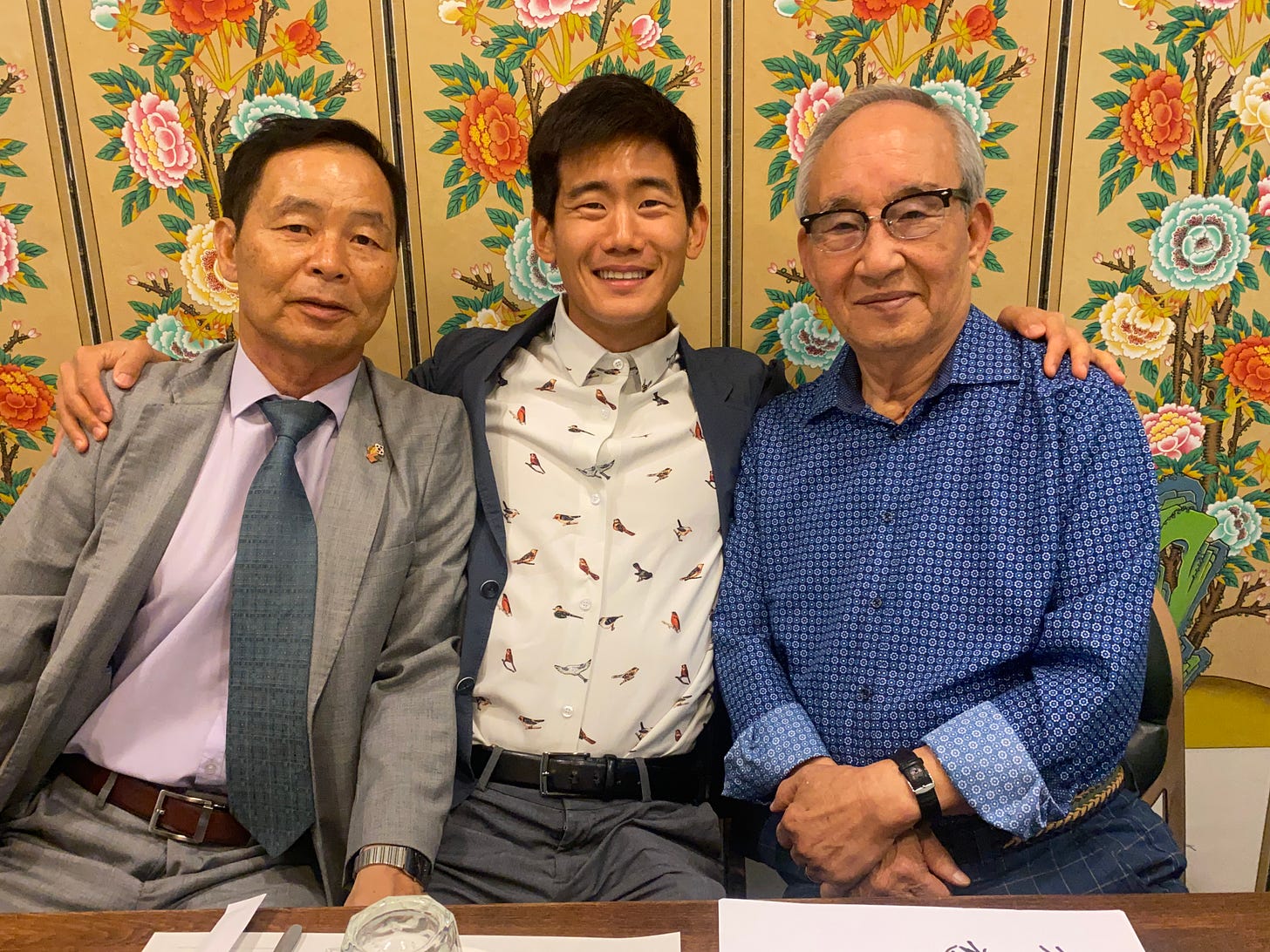
Perhaps the most moving part of my time in Southern California, however, were the two interviews that I had that brought together multiple generations. Thanks to Angie Pak from the Pacific Century Institute (which is also supporting some of the costs of this project), I was able to meet a college student named Faith, who encouraged her own grandmother to share her story of being separated from her father. Part of what made the interview so special was that Faith’s father allowed us to use his office space. As she said a final prayer for her relatives, expressing her hope that her granddaughter can carry on her legacy and visit North Korea someday, I realized how this kind of precious encounter between grandmother, father, and granddaughter is so rare, yet embodies the kind of intergenerational understanding that this project hopes to facilitate.
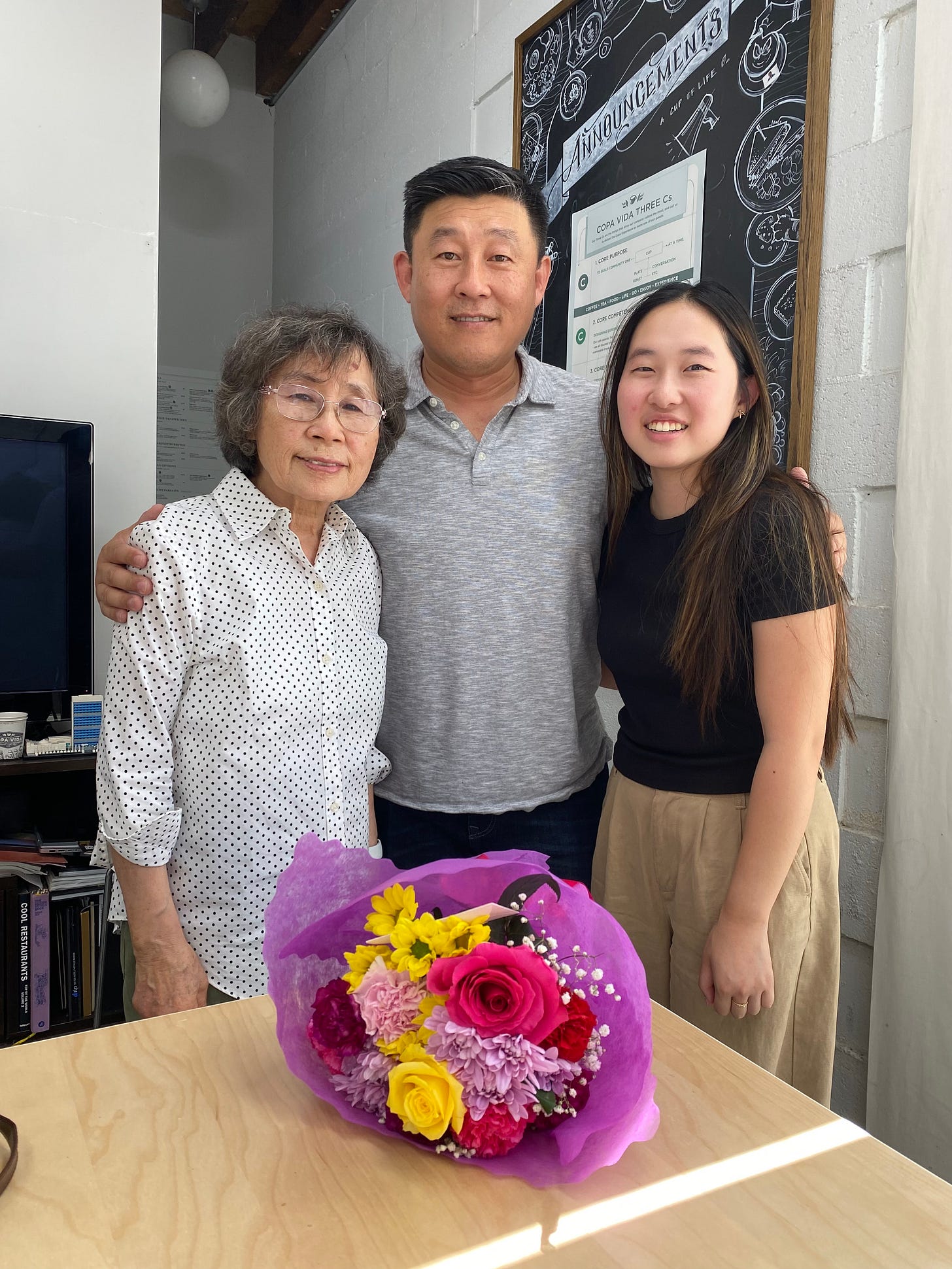
I felt similarly in the last interview that I had, in which I was able to visit the home of Mrs. Hyo Sun Yang from Kaesong, who hasn’t seen her father since 1950. What truly inspired me was how her daughter (who first came to the US as a nurse and lives with her mother in Glendale) actually encouraged Mrs. Yang (who was initially hesitant to contribute her story) to speak up so that younger generations don’t forget this history.

I’ve tried to pack in too much already into this post (and my flight is landing soon), but with eight interviews now complete, I feel so incredibly grateful not only to the interviewees themselves for being vulnerable and courageous enough to contribute their stories, but also to their family members and friends who believe in the importance of this project and encouraged them to speak up. Sometimes holding these stories and emotions feels quite heavy (like when I broke into tears in the car after one of the interviews), but for now, they feel like blessings that keep me moving forward despite the unexpected obstacles along the way.
Filled with a sense of (be)longing,
Paul
*For a more detailed feature on Korean American divided families in LA like Mr. Kwon, check out this documentary from Voice of America


